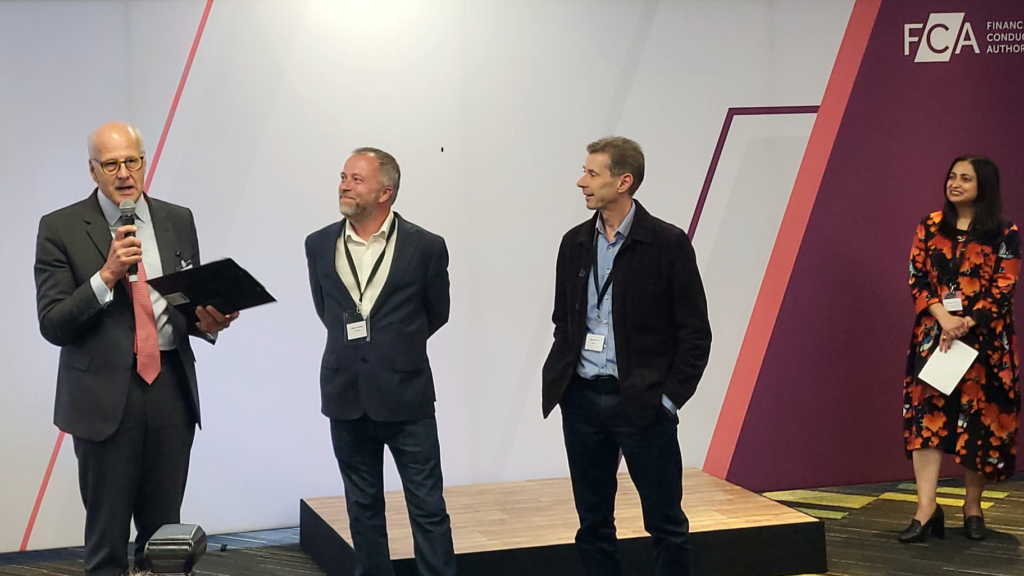
NestEgg presented its Broker Platform at the FCA TechSprint last week, winning the Fast Solution’ award. The judging panel recognised the rapidity with which our platform can scale to connect declined borrowers to community finance. This means:
- A better decline journey for applicants
- Millions of pounds interest saved by borrowers living in the 20% poorest areas
- Improved compliance with the Consumer Duty
There’s urgency. More than 3 million people are using loan sharks. A further 1 million people are using high-cost credit. Borrowers are paying back around £1,750 for every £1,000 borrowed.
Need to borrow, want to save
The TechSprint focused on better support for declined loan applicants. However, all the financially excluded applicants NestEgg spoke to didn’t want to talk about borrowing. Saving mattered more. Borrowing was a means to an end, but not the main goal. Therefore, NestEgg’s ability to amplify the benefits of Save as You Borrow (SAYB) Schemes set it apart from other ‘aggregators.’
SAYB commits a borrower to paying an agreed amount into a savings account alongside the loan repayment. At the end of the loan, borrowers will have built a small nest egg, reducing their need to borrow in the future.
After five years membership of a credit union, borrowers typically have 50p saved for every £1 borrowed. 75% of savings are held by people living in households in the top 20% most deprived neighbourhoods in the UK.
Credit and savings are inextricably linked. Two sides of the same coin. SAYB provides a joined up solution to the fact that 14 million people have either no savings or less than £100 put away.
Deadline to breadline
By focusing on people with the lowest incomes, NestEgg can deliver the greatest benefit. On average, people have enough savings to keep them going for 19 days without income. However, those with incomes under £20k don’t have enough to meet their essential expenditure even for one day. SAYB is the best nudge to reduce this ‘resilience gap’.
The needs of declined applicants
The Money Advice Service found that, amongst declined applicants:
- 42% want a tool showing their chances of acceptance
- 38% want credit scoring tips
- 29% want info on finding alternative forms of credit
NestEgg’s broker platform delivers all of the above.
Partnership not competition
There was friendly competitive tension going into the pitches. However, collaboration was the outcome. An innovative eco-system means firms no longer have to build everything themselves. For example, benefits calculators and identification services support access to credit. NestEgg’s platform provides one easy route to credit unions. Such an eco-system supports the required multidisciplinary approach to financial inclusion.
Locating advice
Seamless and timely referral to money advice is hard. People with problem debt often seek to resolve issues themselves and not always with success. Furthermore, millions are ending up with illegal money lenders. The FCA Boundary review for advice will help more firms, including NestEgg, do more at the initial point of contact.
Banks are key
£4 in every £10 of personal lending is made by the five largest UK banks. A further 15% is issued by the neobanks. Ensuring people have no need to use high-cost credit and loan sharks, requires the largest loan providers to be at the forefront.
Lloyds Banking Group is leading the field. It is partnering with NestEgg to run a test in its Merseyside and Manchester branches. Loan requests received for essential requirements, which they are unable to fulfil are referred to the NestEgg platform with the rate of acceptance being high. Fair4All Finance have part-funded the pilot, further removing any barriers for credit unions to sign up.
It was also encouraging to see NatWest Bank outline its approach during the TechSprint.
The capital question
Critically, to meet the demand for loans credit unions must capitalise. This involves both institutional capital (reserves) and lending capital (shares). For larger credit unions the limits on individual and corporate shareholdings are restricting growth. If more banks refer declined loans, more capital will be required.
Data-driven strategies
NestEgg has an unrivalled data set that can inform financial inclusion strategies. Relationships between credit data and open banking can reveal much about how people are using credit and spending money. For example, during the TechSprint, NestEgg found that people with thin credit profiles tend to have lower credit scores than those with adverse credit histories. In other words, borrowers who default on agreements are more likely to be accepted (using credit score) than those who have done nothing wrong.
Join in
NestEgg and Lloyds Banking Group, with the support of Fair4All Finance are continuing to deliver the test. If you’re a lender or loan provider and would like to discuss joining NestEgg’s platform, or you want to discuss how our data can inform financial inclusion strategies, get in touch.
Book a demo now
Get insights into responsible lending
Enter your email to get insights once or twice a month
No spam. Unsubscribe anytime.
